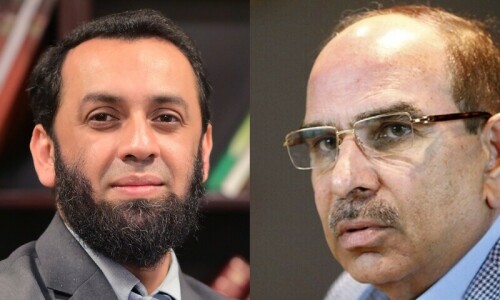
Since the beginning of 2024, Pakistan has witnessed a rapid surge in the targeted killings of journalists, with at least eight lives claimed thus far. In May alone, four journalists were killed, the highest fatality count in a single month since 1992, according to the Committee to Protect Journalists (CPJ).
In an ideal world, such a grim milestone would be followed by strong actions from the policymakers of the country. However, in Pakistan, the topic of discussion is not how to protect the lives of those who safeguard the public’s right to information, but the restriction of the flow of information itself.
This is the case with the deployment of the equivalent of the ‘Great Firewall of China’ in Pakistan, intended to monitor all online traffic.
Details of this firewall remain shrouded in secrecy, with officials tight-lipped on the matter and limited data availability in the public domain. There is scant information on its mechanics and dynamics.
Rumours are rife that Pakistan will soon implement a draconian form of online censorship, inspired by the Chinese example. Can Pakistan really block all controversial material and activity online?
Farieha Aziz, a digital security expert, says there remains a lot of confusion and speculation over the matter due to the secrecy. “What I understand from it is that it won’t be a replica of the Chinese firewall, but something different,” she tells Eos.
WEEDING OUT ‘CONTROVERSIAL MATERIAL’
As per multiple news reports, this firewall will employ deep packet inspection (DPI) and perform IP-level blocking. DPI can look through online data packets for “controversial material” and, once such material is found, it can also locate the IP address of the sender of that “controversial material.” This will allow the authorities to pinpoint the location from where any message has been generated and disseminated.
But what is deemed controversial can vary from country to country. For instance, in progressive societies, such technology is used to combat serious crimes, such as child pornography. In Pakistan, the focus will likely be on suppressing “anti-state sentiments.”
“I guess we have to wait for more information to come to light,” says Aziz before adding: “But one thing is for sure: this is another step in implementing more censorship in the digital domain for the average Pakistani.”
MYOPIC POLICYMAKING
No one is surprised by this latest blow to human rights in Pakistan. After all, we are a country that has a history of curbing such rights under the pretext of “national security.”
What is surprising, though, is the apparent naivete of our policymakers regarding the digital world. The current ban on X (formerly Twitter) can be seen as a prime example of this issue.
Despite the efforts to limit its access inside Pakistan, common citizens and the entire lot of current government officials continue to access the site via virtual private network (VPN) services, rendering it pointless.
This ban has inadvertently boosted the business of international VPN service providers. According to a report by Forbes, after this ban, international VPN services recorded more than a 100 percent jump in demand for their services in Pakistan, with some reporting a 400 percent increase in the rate of new users inside Pakistan.
And the unfortunate bit about these restrictive measures is that they often gain support among the country’s top informational technology (IT) experts.
Take the surprising example of Dr Umar Saif, the former caretaker IT minister, who publicly endorsed a nationwide shutdown of X in a post in November 2022. Dr. Saif’s justification, ironically published on X, was that “Twitter (X) is used by less than 3.5 percent of Pakistanis and most of them are trolls from a certain political party.”
CIRCUMVENTING CURBS
Faysal Chaudhry is a broadcast journalist who covers militancy, among other issues, and regularly uses VPN services to access banned websites.
He agrees that the firewall project is likely to target supporters of a specific political party, a reference to the Pakistan Tehreek-i-Insaf (PTI). “But those advocating against human rights abuses, such as enforced disappearances, will also be under the radar,” Chaudhry tells Eos. However, he believes that VPN users would still be able to circumvent the ban on proscribed content.
Eos reached out to three leading VPN service providers for their perspective on the matter.
NordVPN told Eos that the effectiveness of such firewalls is inconsistent, calling it a “hit and miss.” The spokesperson at ExpressVPN stressed their ongoing efforts to innovate and ensure user access to the free internet. Proton VPN responded by saying that, if such a firewall is established, their service would improve their product accordingly.
You do not need to be an expert in IT to understand the underlying common theme in these statements. The paid VPN service providers seem determined to overcome any censorship efforts that are aimed at causing hindrance to their users’ online experience.
In a separate response to Eos, ExpressVPN confirmed that their services are also being used inside China. This raises several questions on the firewall’s efficacy and the rationale behind purchasing such technology.
According to a report by Techopedia, a popular digital educational platform on technology, China has seen a spike of more than 90 percent in VPN users in the country since 2022. It says these VPNs can “widely circumvent China’s Great Firewall”, which is similar to the technology that Pakistan is rumored to be putting in place.
DANGERS TO FREE SPEECH
So, if we have data showing that VPNs can effectively breach the “Great Firewall of China”, why are the Pakistani authorities still investing in it?
“Historically speaking, free speech has been a persistent challenge for those in power in Pakistan, even though it is an essential component of any progressive society,” says Chaudhry. He views the firewall project as another attempt by the state to crack down on dissenting voices.
“While it’s premature to judge the effectiveness of this firewall, I believe people will find ways to bypass it,” says Chaudhry. “Pakistani civil society has a strong history of resisting such restrictions on freedom of speech,” he adds.
Freedom of speech has always been a headache for the powerful in Pakistan, with the resilient members of our civil society resisting attempts to stifle it. The latest attempt to police the internet, yet again under the guise of national security, will put the state and civil society back in another tug of war.
While the state more often than not comes out on top, each such episode erodes the public’s trust in the authorities.
This raises the question: why do the state authorities continue repeating this cycle, where they are pitted against those they have to govern, instead of focusing their energies on more fruitful endeavours?
Ultimately, this decision rests with the current government. But it would do well to take a leaf from George Orwell’s political masterpiece, Animal Farm.
In it, the pig Napoleon — based on the Soviet dictator, Joseph Stalin — tries to control the farmhouse by asserting authoritarian policies. But it is those very policies that lead to his downfall.
The writer is a broadcast journalist.
X: @SherazKRajput
Published in Dawn, EOS, July 21st, 2024














































Dear visitor, the comments section is undergoing an overhaul and will return soon.